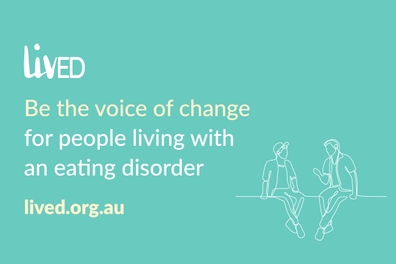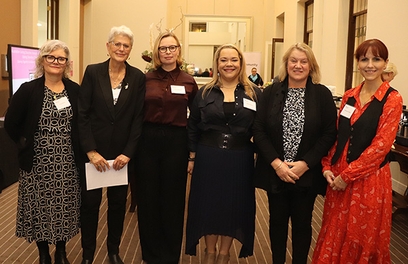
livED is the first of its kind in mental health research, co-designed by lived experience, clinical and digital experts uniquely developed to allow people to share their story, their way.
19 July 2023
How do you map the current state of knowledge and identify evidence gaps to inform policy? Find out how a rapid review offered a unique opportunity to draw on the knowledge of worldwide eating disorder experts and researchers to create the Australian Eating Disorders Research & Translation Strategy 2021-2031.
Rapid reviews are a form of knowledge synthesis. They are used to quickly produce evidence for decision making processes to address high priority or urgent health concerns. They highlight areas for investment and investigation, and provide researchers, service planners and providers and research funders rapid access to quality current evidence which has been synthesised and organised to assist decision making.
Emma Bryant, Researcher with the Australian Eating Disorders Research & Translation Centre explained the importance of Rapid Reviews on policy and decision-making processes.
“A Rapid Review is a particularly impactful type of evidence review and synthesis because it provides more timely information than a regular systematic review does – an approach that is especially useful to inform policy and decision making,” said Emma Bryant.
“Rapid Reviews have been adopted by the World Health Organisation and other leading healthcare agencies around the world - they essentially involve key stakeholders and experts getting together and agreeing upon broad search terms, using fewer databases than a systematic review would, to provide a snapshot of key findings – or a high-level synthesis.”
Developing a national strategy on eating disorder research
A series of Rapid Reviews were conducted to map the current state of knowledge, identify evidence gaps, and inform the Australian Eating Disorders Research & Translation Strategy 2021-2031.
“The approach offered a unique opportunity to draw on the knowledge of worldwide eating disorder experts and researchers from Australia,” said Emma Bryant.
“We needed to understand the literature to date on eating disorders – what do we know, what don’t we know, what the gaps are – to produce a thorough evidence-informed blueprint for eating disorders research in Australia for the next 10 years and beyond.”
“The strategy aims to inform and transform prevention programs and treatment efficacy and accessibility across a range of health and community settings.”
Overcoming challenges
Any complex research process has its challenges, and the Rapid Reviews were no exception.
“With any review there are logistical challenges to work through when you’re dealing with a large volume of information, but in this case, we were covering an entire field of research so the task was especially large! However, we worked methodically and systematically in teams with support from a large consortium of national experts, so it all worked very well in the end,” explained Emma Bryant.
“What was missing” Or identifying the research gaps
“Given the historically low investment in eating disorders research in Australia and overseas, we were able to identify a range of knowledge, translation, and implementation gaps in eating disorder research. This includes research into what is happening around prodromal and early stages of illness, how people are being identified and brought into treatment, treatment models and pathways, and long-term outcomes for individuals who do receive treatment,” Emma Bryant said.
“The goal of the Centre is to support and build on the work that is being done, to target a number of the key research and translation priority areas, and to work in a co-design way with people who have lived experience, carers and clinicians, to ensure that the research we conduct, and coordinate will be as impactful in the real-world as possible.”
Collaborating for a better future
“These Rapid Reviews were truly collaborative. The Australian Government funded InsideOut Institute for Eating Disordersas part of the strategy, but we worked with a national research consortium comprised of expert ED researchers, individuals with lived experience (including carers) those working in policy, advocacy, and with Healthcare Management Advisors Australia,” said Emma Bryant.
“It’s been inspiring to see people across the nation who are passionate about improving the lives of people with eating disorders work together on such an important project. I think that’s been the most exciting thing!”
livED is the first of its kind in mental health research, co-designed by lived experience, clinical and digital experts uniquely developed to allow people to share their story, their way.
The AEDRTC’s core vision - collaboration between like-minded researchers, clinicians and people with lived experience to change the way eating disorders research is conducted in Australia - was central to everything at Think Tank 2024.
Monthly, 1-hour meetings including presentations from Australian eating disorder researchers about their work with the opportunity to join a co-design discussion.
livED is the first of its kind in mental health research, co-designed by lived experience, clinical and digital experts uniquely developed to allow people to share their story, their way.
The AEDRTC’s core vision - collaboration between like-minded researchers, clinicians and people with lived experience to change the way eating disorders research is conducted in Australia - was central to everything at Think Tank 2024.


